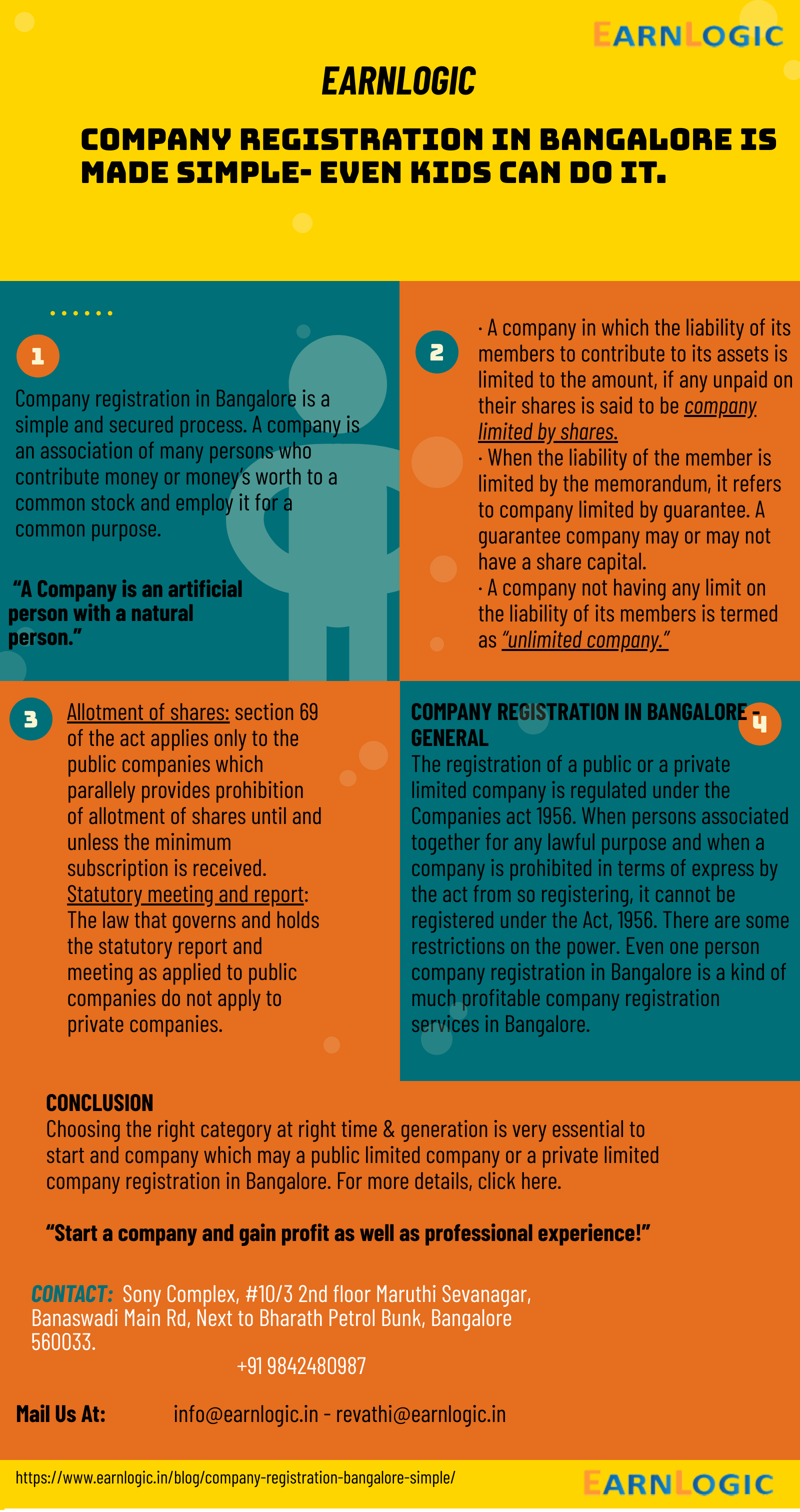WHAT IS A COMPANY?

Company registration in Bangalore is a simple and secured process. A company is an association of many persons who contribute money or money’s worth. ( to a common stock and employ it for a common purpose). The common stock is visible in terms of money and it is the capital of the company. The person who contribute it or to whom it belongs are its members. The proportion of the raise in capital to which each member is entitle is his/her share. The separate personality or entity of a company signifies that a company is separate and distinct from its members. A company must contain a name and by that name it may sue and be sued. Without the presence of shareholders or members, the company will not have separate existence.
A registered company can have own property and even it can have banking account in its own name. Similarly, a company must comply with the formalities of registration required under the provisions of the Companies Act, 1956. A company can-not stand independently without the part of Board of Directors, Managing, Director, agents, Director, etc.
“A Company is an artificial person with a natural person.”
TYPES OF COMPANIES

- In general, companies are broadly classified as private company and public company under the Companies Act 1956. There are companies that is limit by shares, guarantee and unlimited companies too. A company in which the liability of its members to contribute to its assets is limit to the amount, if any unpaid on their shares is said to be company limit by shares.
- When the liability of the member is limit by the memorandum, it is commonly to be company limit by guarantee. A guarantee company may or may not have a share capital.
- A company not having any limit on the liability of its members is termed as “unlimited company.” When comparing a private limited company and a public limited company, there arises many differences in company perspective. The minimum and maximum number of member in a private limited company is 2 and 50 . Whereas 7 and above in public limited company. The Article of Association (AAA) of a private limited company restricts share transfer. Whereas in a public limited company, there is no restriction.
PRIVILEGES ENJOYED BY PRIVATE LTD COMPANY IN BANGALORE

Allotment of shares: section 69 of the act applies only to the design of the public companies which parallely provides prohibition of allotment of shares.( until and unless the minimum subscription is receive).
Statutory meeting and report
The law that governs and holds the statutory report and meeting as applied to public companies do not apply to private companies. Managerial remuneration and rules regarding directors, demand for poll and inspection of books of accounts. The above are some of the other privileges can be enjoyed in a private limited company. A private company which is not a subsidiary of a public company and is not subject to any restriction in the matter of the concept managerial remuneration. The demand for poll is at least 5 members in case of public companies . (one or two in case of a private company). In a private limited company, no person other than a member of the company concern shall be entitl to inspect or obtain loss and profitable account of the company under the section 610.
LEVERAGES OF AN INCORPORATED COMPANY IN BANGALORE
The birth of business is much more than death of a business. So, the formation of business organization is on the side of increase not decrease; it may be either private or public or partnership or LLP registration in Bangalore. Limited liability is undoubtedly the striking advantage of corporate form of business over unincorporated bodies. The share-holders or members are not personally liable and answerable to the creditors in the event of business failure. The most vital reason for scope of borrowing is that, the company may deal with assets charged in the ordinary course of the business.
The rights and liabilities of the members are most define than the partners in the firm. There is another main advantage of an incorporated company; it is the capital structure of incorporation and its flexibility. Since, the source of finance for public company are multifarious and varied, public company is a free bird in raising its capital. So, the public companies are in a position to appoint better and high skilled persons in the management team.
COMPANY REGISTRATION IN BANGALORE -GENERAL

The registration of a public or a private limited company is regulate under the Companies act 1956. When persons associates together for any lawful purpose and when a company prohibits in terms of express by the act from so registering, it cannot be registered under the Act, 1956. There are some restrictions on the power. Even one person company registration in Bangalore is a kind of much profitable company registration services in Bangalore. No person, or partnership consisting more than 10 persons shall be form for the purpose of carrying on business of banking. (unless it is register as a company or form in pursuance of some other Indian Law).
The memorandum of a company which is limit by guarantee shall also state that liability of its members has limit. It also states that each member undertakes to contribute to the asset of the company in the event of its being wound up. ( while he is a member or within 1 year, he cease to be a member). Each and every person who is a member of a company or an association is form in contravention of this section shall be punishable with fine.
PROMOTION AND FORMATION AGREEMENTS

The close alliance of law with business will be evident when we come across the term promoter in company promotion, as the term promoter is a term and not a law. The section provides that the “expression promoter” is a party to the preparation of prospectus or of the portions thereof containing the statement, but does not include any person by reason of his action in a professional capacity for persons engaged in procuring the formation of the company.
The company formation and the company registration promoter may purchase property with the intent of forming a company not by him or her-self but by others and transfers the entire property by which the company is form. The company promoter is a person who procures the underwriting of the company’s capital and is a party to the preparation and issue of prospectus. The legal position of promoter is very complex. They are describe either as agent or as trustees. For the purpose of statutory liability, like a director, the duties and liabilities of promoters are so far.
NEED FOR PUBLIC ISSUE OF SECURITIES IN COMPANY REGISTRATION
The striking difference between a public limited company and a private limited company lies in the matter of floatation’s. In a private company those who forms the company involve in necessary float also. But no such floatation is possible in case of a public company, where the bulk of the capital is from the outside public.( who respond to the company’s invitation). It is agreed that but for few basic and heavy industries, the establishment of public companies particularly in the light of recession, already set in the corporate market of the world, may not be that easy.
PUBLIC ISSUE IN PRIVATE & PUBLIC COMPANY

A private limited company is converted into public limited company, it can be continued as a private company. It can be deemed to be a public limited company or a private limited company of the basis of investment. The growth and development of public company are as such not to establish a new enterprise or new discovery. The conversion from a private limited company to a public limited company may be either automatic or with a valid reason.
SECURITIES & SHARES
The security for a private limited company includes shares, scripts, stocks, bonds and debentures or other marketable securities of a likely nature incorporated company or other body corporate. It is also applicable in government securities and rights or interest in securities. The act has given an inclusive but does not have exhaustive meaning of the term share. Share stands for share in the share capital of a company and includes stock except where a distinction between stock and share is expressed or implied. Section 25 and section 8 company registration in Bangalore does not need any minimum capital requirement.
DEBENTURES
It is right to a specified amount of the share capital of a company carrying with it certain rights and liabilities while the company is a going concern. Share is not a sum of money but is an interest made in a sum of money and made up of various rights contained in the contract. Whereas, debenture includes debenture stock and bond and other securities of a company whether constituting a charge on the asset or not. In a company registration, debenture has never received any precise definition other than an acknowledgement.
STOCK EXCHANGE REQUIREMENTS OF A COMPANY REGISTRATION IN BANGALORE
In a company, for a free marketability of the security, a company may negotiate with one or more stock exchange to list its securities. The approval of the concerned stock exchange will be required where the securities are listed. A listing agreement is enters into the respective stock exchange and the company listing application must be made in the prescribed form ( which is available from the stock exchange). The prospectus of the company should confirm to the requirements of the stock exchange and it must also satisfy the stock exchange that its articles have suitable provisions relating to common form of transfer, non-enforcement of fully paid up share, calls in advance, forfeiture of unclaimed dividend and right to call of share.

The listing application must enclose number of particulars which the company will forward to the stock exchange. Annual report, profit & loss account, statutory and director’s copy, notice, balance sheets, circular, proceedings copy, call letter and annual general meeting of the company falls under the stock exchange requirement of a common company registration.
LIABILITIES FOR MIS- STATEMENTS IN PROSPECTUS
In general, a prospectus must be complete and perfect in all details, or in other words, nothing should be omitted and nothing must be untrue in a prospectus. Section 65(1) of the companies act provides the circumstances when statements included in a prospectus shall be deed to be untrue. The mis-statements of the untrue statements in the company’s prospectus will also get covered by interpretation of cases of omissions. The civil liability is generally classified into two types, the first thing is general law liability and the second thing is company law liability.
CONCLUSION
Choosing the right category at right time & generation is very essential to start and company which may a public limited company or a private limited company registration in Bangalore. For more details, click here.

“Start a company and gain profit as well as professional experience!”

